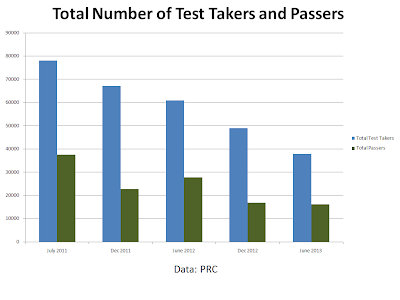While there are over a hundred
websites out there that post exam for nursing results in the Philippines, I took
interest in looking at the nursing exam trends over the last 5 examination
periods, and I would like to share my views and analysis about their
statistics.
Based on the graph above, we
could readily see the steady, linear downtrend in the number of NLE test takers.
Even though the nursing board exam is still one of the biggest licensure exams
in the country (it used to be the biggest, but the current number of test
takers are now similar to those who took the licensure exam for teachers or LET),
the columns indicate the steady decline of test takers. If you’re asking: “How
did it happen that there seems to be less and less people taking the exam?” As
far as I know, there are 3 interrelated factors behind this:
1. Decreasing number of graduates. A
significant decrease of nursing graduates resulted from stricter measures by
the Professional Regulations Commission on the implementation of nursing
programs throughout the country. Nursing schools are being pressed further to
produce a significant percentage of nursing exam board passers, and failure to
do this would result in immediate closure. As a result, nursing programs are
now set on higher instructional and evaluative standards, and it’s getting much
tougher to get a nursing degree.
2. Decreasing number enrollees. Most
people are still affixed to the idea that the only jobs available for nurses
are hospital and clinical jobs, and because there are limited opportunities in
hospitals for hundreds of thousands of nurses, many high school graduates are
becoming discouraged to pursue a career that would include them on the long
list of unemployed professionals. In addition, the Professional Regulations
Commission made a public statement years ago that advised college entrants to
not pursue nursing, and this has also contributed to the decline of enrollees
nationwide.
3. Increasing closure of nursing schools.
Another contributing factor to the decrease of nursing exam takers is the
increasing number of nursing schools closing down. It’s a domino effect – less
enrollees lead to less graduates, and this leads to lesser chances of reaching
the passing standard for these schools. Also, schools tend to downsize its
number of nursing instructors, thus the quality of education is significantly
affected. Some schools nowadays even
operate with only 2-3 full-time faculty members, and even the Dean is now
forced to handle clinical classes just to keep the ball rolling.
Although the almost
proportional decrease of nursing exam board passers is noticeable in the graph,
what’s more important to note here is the consistently low number of test
passers over the last 5 board exams. This has always been the question: “How
come the percentage of those passing the exam is always less than 50% of the
total number of test takers?” Having observed numerous nursing schools and
programs, I believe that there are 2 major reasons why the overall nursing
passing rate is consistently low:
1. Lack of solid instruction. It’s sad to
know, but it’s true for most nursing schools, and while the PRC guidelines
provide a workable plan for solid nursing instruction, the problem is with the
implementation. Deans and instructors should work proactively and cooperatively
to develop good quality instruction by establishing relevant syllabi, definite
program objectives, meaningful learning experiences and instructional methods,
and proper evaluative methods.
2. Lack of exam preparation. I’m not here
to criticize independent nursing reviewers and review groups, but it is an
undeniable fact that the big reason they sprouted like mushrooms is because of
lack of nursing exam preparation, and I believe that its prime responsibility
lies with nursing schools. In fact it’s only right to commend these nursing
reviewers, and you could only imagine if their service is complemented with
solid instruction from a nursing school. Although attending a nursing review
might increase one’s chances of passing the NLE, let me advise that solid
instruction is the essential factor, and students should rely more to it.
Nursing is a dynamic field
that continually changes with the times, and I personally disagree that people
should be discouraged to pursue it. For me, it is false to think that the
overall demand for this profession is dwindling – only the clinical work
settings are. Schools of nursing should readily and appropriately change with
the shift in nursing fields, and implement programs that answer the current
demands of the health industry. If you want more info about other nursing
careers other than hospital work, click here.
Furthermore, quality nursing
education is needed to break the cycle of poor nursing exam performance, and
nursing institutions should always strive for resolute, excellent education.




